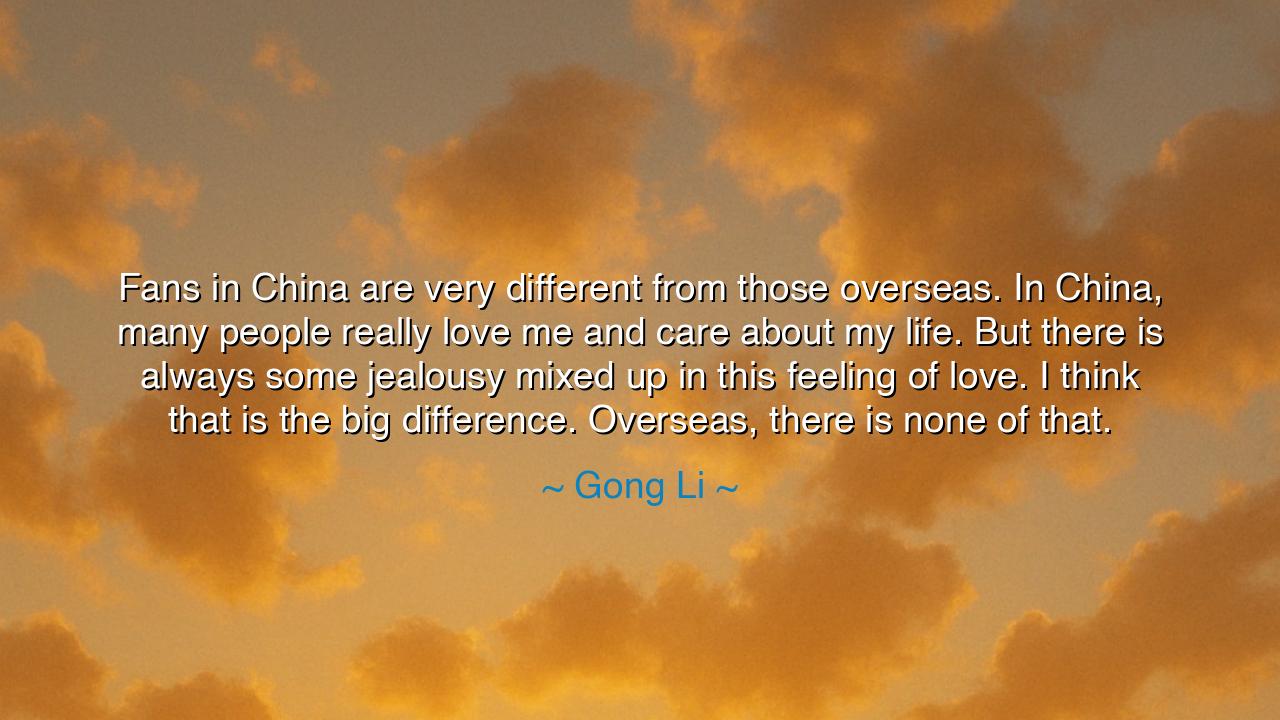
Fans in China are very different from those overseas. In China
Fans in China are very different from those overseas. In China, many people really love me and care about my life. But there is always some jealousy mixed up in this feeling of love. I think that is the big difference. Overseas, there is none of that.






In the words of Gong Li, there is both sorrow and wisdom: “Fans in China are very different from those overseas. In China, many people really love me and care about my life. But there is always some jealousy mixed up in this feeling of love. I think that is the big difference. Overseas, there is none of that.” These words are not merely about fame or admiration — they are a reflection on the dual nature of love and envy, on how affection, when touched by comparison, can turn to pain. Gong Li, the luminous actress whose performances transcended borders, speaks as one who has lived under both the warmth of adoration and the chill of jealousy’s shadow.
From the ancient times, the sages knew this truth well — that love and envy are twins born of the same heart. The one reaches out to cherish, the other grasps to possess. When a person is beloved, the hearts of others mirror both devotion and disquiet. In China, Gong Li’s beauty, talent, and courage stirred not only admiration but also the ache of comparison — the feeling that her brilliance made the world’s imperfections more visible. It is not hatred that drives jealousy, but longing; not malice, but the pain of measuring oneself against greatness. Thus, her words carry the weight of ancient wisdom — that to be loved greatly is also to be misunderstood deeply.
The poets of old would have recognized her struggle. Consider the tale of Sappho, the poetess of Lesbos, whose verses captured the tenderness and torment of love. She too was adored by many and envied by more. Her beauty and genius became both her crown and her cross. Those who loved her words envied her voice; those who cherished her presence feared their own smallness beside her flame. So it is with all who shine too brightly — their light draws the moth as well as the flame-seeker. Gong Li’s reflection is but the modern echo of an ancient lament: the price of being beloved is to be envied.
Yet her insight also reveals the contrast between cultures, between the East and the West. In her homeland, love is intimate, personal — it binds the heart not only to admiration but to identity. To love a star is to claim a part of her, to feel her triumphs and sorrows as one’s own. Thus, when she rises too high, some hearts ache with the sense of distance, as though a daughter or sister has left them behind. But overseas, where the self stands apart, admiration remains impersonal, detached — love without ownership, appreciation without envy. This, Gong Li sees clearly: that the deeper the bond, the sharper the sting of comparison.
Let us then ponder what this means for us who love, and who are loved. Love that seeks to possess will always suffer, for it binds itself to illusion — the illusion that another’s beauty or success diminishes our own. But love that rejoices in the light of others becomes freedom itself. When we see someone rise, we must not ask, “Why not me?” but “What can I learn from their ascent?” For every soul has its own path, and the stars in the sky do not compete; they simply shine in their appointed places.
Think of Michelangelo and his fellow artists of the Renaissance. Many envied his genius, his divine hand that carved the Pietà and painted the Sistine Chapel. Yet those who transcended envy — those who let his greatness ignite their own — became masters themselves. In the same way, those who look upon others’ brilliance with gratitude, not resentment, draw closer to their own potential. Jealousy diminishes; admiration expands.
Thus, the lesson of Gong Li’s reflection is not about fame, but about the human heart. Love must be purified of envy, lest it destroy the beauty it longs to hold. To love purely is to admire without comparison, to care without control. This is not an easy task — it requires humility, and the wisdom to know that another’s success does not steal your light but reflects it.
So, my listener, when you feel the stirrings of envy, do not turn away in shame. Instead, let it become your teacher. Ask it what it fears, and remind it that you too are made of light. Rejoice when another blooms, for it is proof that the garden of the soul still thrives. And one day, when you rise — as Gong Li did, as all who persevere do — may your light inspire love untainted by jealousy, and admiration that lifts, not binds. For such love, pure and steadfast, is the highest form of human grace.






AAdministratorAdministrator
Welcome, honored guests. Please leave a comment, we will respond soon